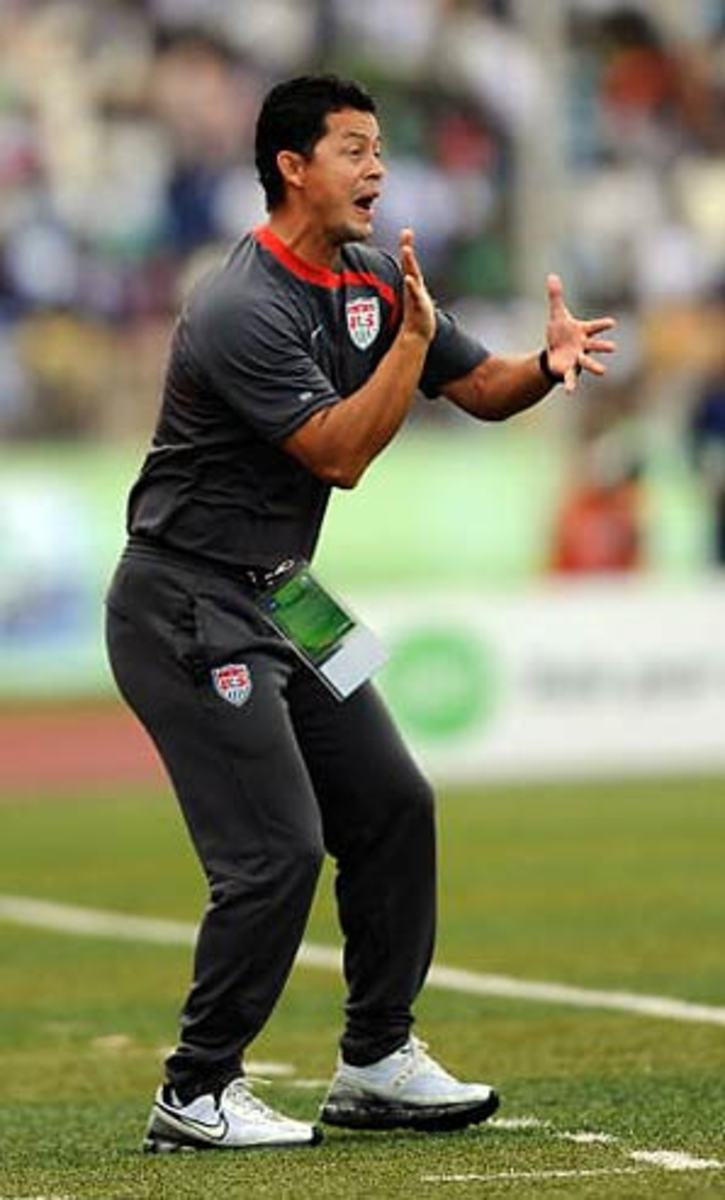Wilmer Cabrera and U.S. U-17s regroup after Europe trip canceled
One of Wilmer Cabrera's favorite words is "expose." It peppers his speech whenever the coach of the United States U-17 national team speaks about the young players under his charge, and his use of that word can, at times, seem harsh.
"Players need to be exposed to different styles of play, to the different speed of the game that other countries play at, but you also need to expose them in a different way," he says. "They need to be beaten so we can see where they are weak. We need to expose the areas they need to improve."
Cabrera, a Colombia native in his second go-round with a group of U-17s, hoped to expose his players' faults during a two-week trip to Europe in April. The plan was for the U-17s to play against the youth teams of Manchester City and Wigan in England, and then journey to Italy for the International Tournament of Gradisca, in which the U.S. was slated to play Mexico, Romania and Croatia. But the volcanic ash cloud that halted air traffic over Europe struck just as the team was in Philadelphia preparing for its flight to England.
The team returned to Bradenton, Fla., where all but one of the players on the roster for the trip is in residency. As the air traffic crisis continued, U.S. Soccer officials quickly concluded that the team could not get a flight into England in time to complete that portion of the trip. When Cabrera informed the players, he asked them to stay focused on the tournament in Italy and wisely did not tell them about the surprise U.S. Soccer had put together for them that was also scraped: a trip to see Everton and senior team goalkeeper Tim Howard play.
"The kids were upset, but we asked them to think about Italy, about that opportunity," Cabrera says. He quickly lined up a game against the Tampa Bay Rowdies, a USSF division II team. "They did well. They thought they were going to Italy and the intensity was there."
A few days later, having exhausted every option in an effort to get the team to Italy, U.S. Soccer cancelled that segment of the trip as well.
"The kids were destroyed," Cabrera says. He tried to hold a practice but the players' concentration was poor. He then gave them a weekend off. "So they could go to the beach or go to the movies and relax and put it behind them."
Cabrera hasn't entirely put the cancelled trip behind him. Opportunities for a U.S. youth national side to play a slate of games like that are rare. He can schedule more matches against lower division pro teams or youth academy squads, but the style of play and quality of the opposition doesn't compare to what his team would have seen in Europe. He also missed a chance to scout Matt Dunn, a midfielder with the youth team for FC Koln in Germany, who was on the U.S. roster.
"We know him and he is playing at a high level there in Germany, but in order to make him part of this team he has to be with his teammates, get used to our style, and that takes time," Cabrera says. "It was a missed opportunity, which was sad for us and frustrating for him."
Cabrera says that this group of U-17s are less skilled on the ball than his previous lot of players, which included bright talents like Luis Gil (now with Real Salt Lake), Nicholas Palodichuk and Sebastian Lletget (West Ham). "They are probably a little less talented but are harder workers," he says.
He is optimistic that if the U.S.'s best prospects aren't currently on the 40-player roster, others will be found, and potentially a few might come from Mexico. "We are scouting a lot of American kids playing there. They are playing at a good level and we need to make sure we keep the door open for them," he says. "You at first have to pick the kids who are mature enough, maybe those who matured early, but with a roster of 40 you can take a few knowing they are not ready now but that they might develop."
The U-17s are scheduled to play FC Dallas Juniors on May 8. It's not exactly the youth teams of Manchester City or Wigan, and there are no events between now and the start of qualifying for the 2011 U-17 World Cup in Mexico that compare to the International Tournament of Gradisca.
"I don't know how you would replicate the experience that would have been for [the players]," Cabrera says. "We will have to find other ways to expose them, to see where we are at right now and how much we have to work on."






